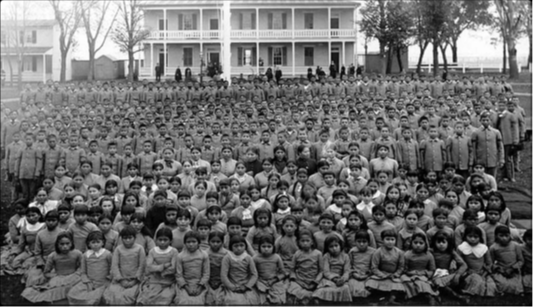The U.S. Department of Interior recently released a long-awaited investigative report on the Federal Indian boarding school system.
Reporter Feven Gerezgiher takes a look at its findings and speaks with one of its research partners about what this means for Indian Country.
From 1819 to 1969, the United States funded 408 boarding schools for American Indian, Native Hawaiian, and Alaskan Native students.
These schools were a means to culturally assimilate Indigenous people and to dispossess them of lands across what are now 37 states.
This history is ever present in Indian Country, but for the first time, the U.S. government is acknowledging the harm done.
This is U.S. Secretary of the Interior Deb Haaland at a press conference on May 11th.
Secretary Haaland: “The federal policies that attempted to wipe out Native identity, language, and culture continue to manifest in the pain Tribal communities face today, including cycles of violence and abuse, the disappearance of Indigenous people, premature deaths, poverty, and loss of wealth, mental health disorders [chokes up] and substance abuse. Recognizing the impacts of the Federal Indian boarding school system cannot just be a historical reckoning. We must also chart a path forward to deal with these legacy issues.”
Haaland requested an investigation into the Federal Indian boarding school system last June following the discovery of a mass burial site at a former boarding school in Canada. The Department of Interior conducted a nine-month investigation that culminated in a 106-page report released last week.
The report identifies 53 marked and unmarked burial sites at different schools across the U.S. The department found records of at least 500 child deaths and expects to find more as the investigation continues.
Samuel Torres is Mexica Nahua and deputy chief executive officer for the Twin Cities-based National Native American Boarding School Healing Coalition. In an interview last Thursday, he said this moment is a testament to the importance of Native leadership in government.
Samuel Torres: “It’s a day of mixed emotions, really a long week of mixed emotions. We are, of course, grateful for the leadership of Secretary Deb Holland for producing this initiative through the Department of the Interior. I think one of the reasons why it’s been such a huge mixed bag of emotions is that we’re recognizing and reflecting that just a short while ago, the federal government had made it very clear that they had no interest in diving deeper into these inquiries.”
Torres said years ago, the nonprofit had requested and been denied answers about federally operated boarding schools. It then began compiling research independently, later becoming a critical research partner to the report.
It’s pretty momentous that the Department of the Interior recognizes that students died in these institutions, that hundreds, potentially even thousands of children are in marked or unmarked graves, recognizing the brutal methods of discipline of punishment were routine.
Samuel Torres: “Being able to see that in the bounds of a federal document, I think is something that we have been hoping for, and knowing that it is something that that we can consult that we can look to as a foundational source, I think is a big deal for a lot of people. We will be consulting this as a foundational moment for a long time now.”
The report said the U.S. systematically tried to assimilate Indigenous children with such tactics like renaming them with English names, cutting their hair, preventing the use of their native languages, and requiring them to perform military drills.
It acknowledged rules were often enforced through punishment – through solitary confinement, withholding of food, slapping, or cuffing of Indigenous children.
The report outlines eight recommendations for continuing the investigation and for a healing process. Torres said he is encouraged those recommendations will be heard.
Leveraging the authority, the power, the resources of the government, well, I know for some folks that might seem somewhat symbolic. It is a big deal. It provides a lot of opportunity for folks to be recognized and to be able to build off of this moment and to continue to sustain the movement.
In response to the report, Secretary Haaland announced a year-long tour across the U.S to hear stories from survivors of the federal Indian boarding school system.
Representative Sharice Davids also introduced legislation to establish a truth and healing commission.
For Minnesota Native News, I’m Feven Gerezgiher.


 Pregnancy, Vaccines, and Decision-making during the COVID-19 Pandemic
Pregnancy, Vaccines, and Decision-making during the COVID-19 Pandemic